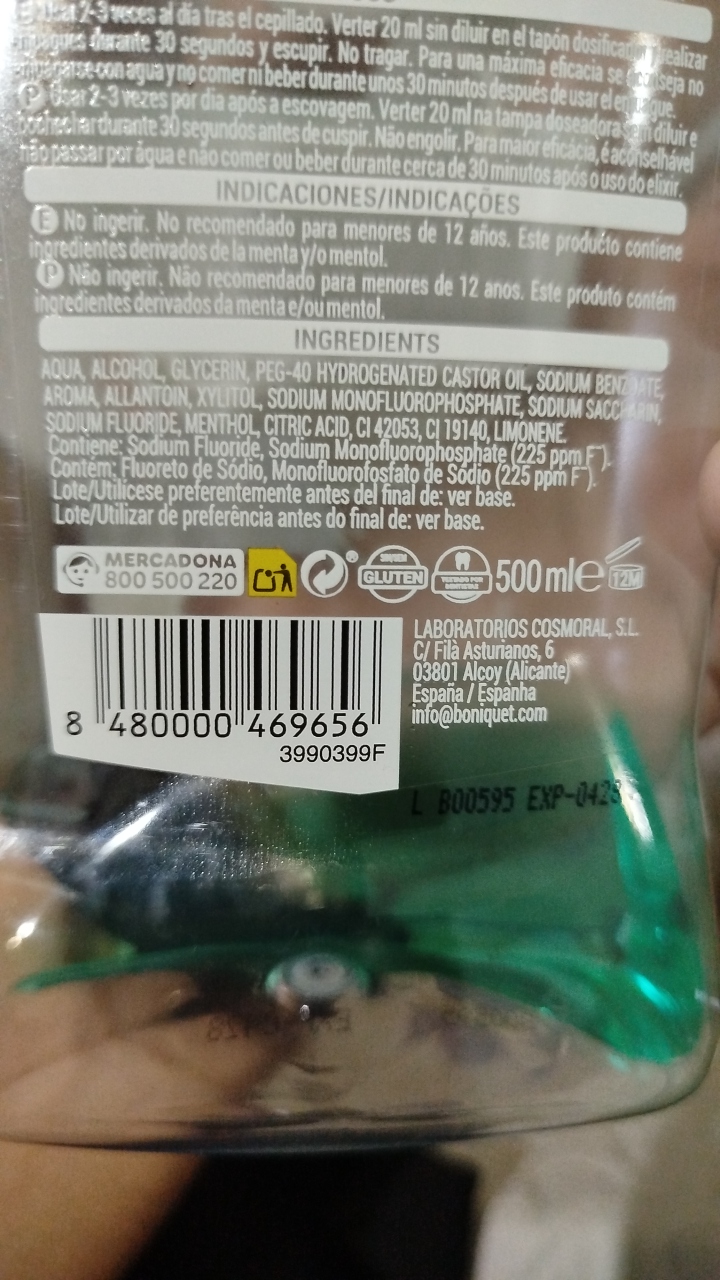
Barcode: 8480000469656
HARAM
📝 Reason: The presence of Haram elements makes this product religiously impermissible. Such ingredients are absolutely prohibited regardless of quantity in Islamic dietary guidelines.
🏷️ Category: Oral Hygiene
📄 Certificates: Do Not Ingest, Not Recommended For Children Under 12 Years Of Age. This Product Contains Ingredients Derived From Mint And/Or Menthol., Do Not Ingest, Not Recommended For Children Under 12 Years Of Age. This Product Contains Ingredients Derived From Mint And/Or Menthol., Ingredients, Gluten, Tested By Dentists, 500 Ml, 12M, Laboratorios Cosmoral, S.L., C/ Filà Asturianos, 6, 03801 Alcoy (Alicante), Spain, Info@Boniquet.Com, Exp 0428
Ingredients:
Details
Understanding the Halal Status of This Oral Hygiene Product
When it comes to choosing products that align with Islamic dietary laws, it’s crucial to know the Halal status of ingredients in your items, especially oral hygiene products. Unfortunately, for the product in question, it has been classified as HARAM due to the presence of alcohol and other questionable ingredients. This article will cover the Halal status of the ingredients in detail and provide insights into why they are deemed permissible or impermissible in Islam.
Halal or Haram: What’s the Difference?
In Islam, Halal refers to what is permissible or lawful, while Haram refers to what is forbidden. The presence of Haram ingredients invalidates the overall Halal status of a product, regardless of the quantity present.
Ingredient Breakdown
Let’s explore the ingredients of this product and their Halal status. Understanding each component is vital for making informed choices.
- Water: Permissible in Islam.
- Alcohol: Classified as Haram due to its intoxicating nature, which is expressly forbidden in Islam.
- Glycerin: Generally considered Permissible in Islam, thus it does not affect the product’s Halal status.
- PEG-40 Hydrogenated Castor Oil: Status is unclear; however, it does not contain forbidden elements.
- Sodium Benzoate (E211): A commonly used preservative that is permissible in Islam.
- Aroma: Generally deemed permissible, depending on its source.
- Allantoin: Also permissible in Islam; it is used for its soothing properties.
- Xylitol (E967): Recognized as a sweetener, it is permissible in Islam.
- Sodium Monofluorophosphate: Safe and permissible, this ingredient aids dental health.
- Sodium Saccharin: Permissible; used as a sweetener.
- Sodium Fluoride: Also considered permissible; it helps prevent cavities.
- Menthol: Permissible; adds flavor and freshness.
- Citric Acid (E330): Commonly found in many products, permissible for use in food.
- CI 42053 and CI 19140: Colorants that are generally recognized as permissible.
- Limonene: Derived from citrus fruits, considered permissible.
Key Takeaways
The decisive factor for the Halal status of this oral hygiene product is the inclusion of alcohol, which is classified as Haram. Regardless of the other permissible ingredients, the presence of any Haram substance means that this product is not compliant with Islamic dietary laws.
Conclusion
If you are looking for Halal oral hygiene options, it is essential to carefully read product labels and consult reliable resources regarding Halal certification. In this case, this product cannot be considered Halal due to the presence of detergent, which is absolutely prohibited in Islamic dietary guidelines. Always opt for products that are certified Halal to ensure your dietary choices align with your beliefs.
Certificates: This product bears warnings: it is not recommended for children under 12 and should not be ingested. Ingredients have also been tested by dentists, indicating that care has been taken in its formulation, despite the Halal concerns.
